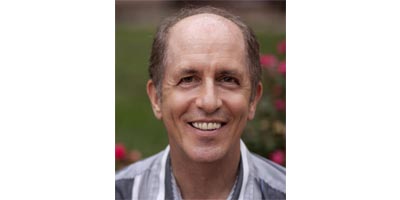IBC2014: Keynote Explores Broadcasting in the Cloud Era
The professional video industry's #1 source for news, trends and product and tech information. Sign up below.
You are now subscribed
Your newsletter sign-up was successful
AMSTERDAM ― Thursday morning’s IBC keynote speeches on the topic of the health of broadcasting were a mixed bag that intermingled promotion with some insight into where the industry is moving in the next couple of years.
Moderated by U.K. journalist and commentator Ray Snoddy, perhaps best known for his long run on the BBC program “NewsWatch,” the keynote talks were genial but not necessarily always on the session’s topic of “Assessing the Health of Broadcasting.” Snoddy started the event off by stating that, while broadcasting is not at all dead, change is moving ever more quickly in the industry.
“The broadcast industry is never, ever boring,” he said.
The first of four speakers was David Abraham, pictured right, CEO of Channel 4, a public broadcaster in the U.K. Channel 4 is known for innovation and responding quickly to audiences, including the world’s first large-scale video on demand offering by any broadcaster.
Abraham said that broadcast today hinges on a central challenge: How to innovate in both the creation of great content and the means by which it is enjoyed by the viewer.
“If you allocated resources effectively between the two, you remain competitive,” he said. “Get this wrong, and you will rapidly become uncompetitive in a marketplace in which so many alternatives exist.”
Abraham told the audience that industry entities need to embrace who they are and show the same face over the air and online.
“Broadcasters are now at a disadvantage if they separate their online brands from their channel brands,” he said.
Announcing that Channel 4 will launch a new branding initiative for 2015, Abraham showed a brief video explanation of the new look, as well as some program promos.
AMERICAN IMPERIALISM?
Following Abraham was Bruce Tuchman, president of the Sundance Channel and MGM Channel Global, both part of AMC Networks International. Starting with a friendly accusation of “American Imperialism” from Ray Snoddy about U.S. companies buying up European production and distribution outlets, Tuchman pointed out that his company’s acquisition was of a Dutch-owned company in the U.K., and not replacing British owners with Americans.
Tuchman focused on promoting AMC’s original TV dramas and films, as well as the indie-friendly offerings of the Sundance Channel. He also touched on the hot button of denying online viewing of cable offerings to cord-cutters who do not subscribe to pay TV, stating that this policy helped ensure good programming.
Next up was Charlie Vogt, CEO of Imagine Communications, one of the companies formed when Harris Broadcast split in two. Vogt noted that, although the company has a strong customer base in North America, more than half of Imagine Communications’ business is from outside North America.
Emphasizing his company’s focus on software products, Vogt struck a nerve when he discussed a situation that’s all too common at industry facilities.
“We can no longer continue to build closed proprietary hardware-centric networks that, every five to seven years, force our customers to do a forklift upgrade,” he said.
IP VIDEO ‘SOONER THAN YOU THINK’
Vogt, who has a strong background in IT before joining Harris Broadcast less than two years ago, also went out on a limb to predict that TV will move strongly onto the Internet in the next two years.
“Video has become the killer app,” he said. “We all have to embrace the change or we’ll be left behind.”
The final presenter was Sam Barnett, chairman of the Middle East Broadcast Group, which feeds a wide range of channels to Arabic-speaking countries across Northern Africa and the Middle East. Among other things, Barnett addressed government censorship and how programming critical of powerful politicians is susceptible to interference and jamming.
“During the ‘Arab Spring,’ [satellite] jamming became the media strategy of choice,” he said.
However, these countries are also hungry for content and open for business. Barnett pointed out that Saudi Arabia leads the world in YouTube viewing and Twitter activity.
These four speakers showed that there is a lot of variety in international broadcasting, and that there is a great deal of thought being given about how to find and grow audiences in a world of fragmenting delivery paths. However, will over-the-air cede dominance to IP delivery in two years? Ray Snoddy promised to have Charlie Vogt back on the stage next year to assess the progress toward that prediction.
The professional video industry's #1 source for news, trends and product and tech information. Sign up below.
Bob Kovacs is the former Technology Editor for TV Tech and editor of Government Video. He is a long-time video engineer and writer, who now works as a video producer for a government agency. In 2020, Kovacs won several awards as the editor and co-producer of the short film "Rendezvous."

